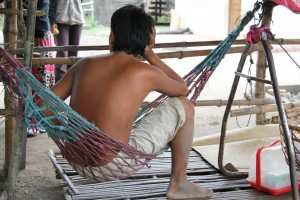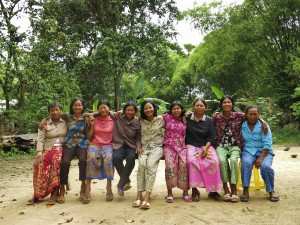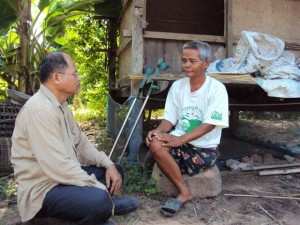The Need for Mental Health Care in Cambodia

Mental Health issues are widespread in Cambodia and there is little in place to deal with this burden.
Cambodia is a country where the population is at a high risk of poor mental health.
It’s estimated that about 40% of Cambodians suffer from mental health and psychological problems.[1] Numerous studies document high levels of Post-Traumatic Stress Disorder in Cambodia [2] and the suicide rate has also been proven to be much higher than the worldwide average.
Much points to Cambodia’s traumatic history as a factor for this tremendous health burden on Cambodian society. Trauma, however, is not the only influence on mental health. Domestic violence and substance abuse, for example, continue to be rife in Cambodia while poverty undeniably also has its effect on the population’s mental well-being. Common mental health disorders are about twice as frequent among the poor as among more affluent citizens. Rapid economic and social change can also disrupt the culture, values and traditions of Cambodian communities that have so far served to unite and give identity to people, affecting their mental health. Furthermore, the role of poor mental health as a leading cause of illness, death and disability keeps growing worldwide, with the increasing numbers of young people affected being particularly worrying. All these factors contribute to what has been labeled ‘Cambodia’s appalling mental health crisis’ affecting individuals, families and society as a whole.
The Gap
Unfortunately, there is tremendous gap in Cambodia between what is needed and what is available to reduce the burden of mental disorders and to promote mental health. For example [3]:
– only 2% of health centers (18 out of 967) offer mental health services to out-patients
– only 59% of referral hospitals (50 out if 84) offer mental health services to out-patients
– only 2 psychiatric in-patient units with a total of 14 beds to service the entire country, about 15 million people
– only 35 trained psychiatrists and 45 psychiatric nurses are available for the entire country, most of them based in Phnom Penh
Furthermore, the quality of mental health care provided in Cambodia is often low, adequate follow-up lacking and referral between services deficient. An over-reliance on medication and a very low mental health literacy (i.e. the ability to recognize mental health problems) also plague Cambodia.
Cambodia’s lack of services is tied to insufficient and unstable financing, a shortage of trained professionals, in particular in rural areas, and a lack of policies and action plans.
At TPO we aim to reduce the gap between the need for and availability of mental health care for those who need it most.
TPO’s Work

Happy, stronger, healthier – rural women after going through a self-help group program with TPO Cambodia.
At TPO, we are determined to make a difference for people with mental health problems and their families, enabling them to function more effectively within their work, families and communities. We provide treatment, but work equally hard on raising public awareness of mental health and psychosocial issues, and train key community resource people at the grass-roots level so we also reach the disadvantaged people in Cambodia’s most rural areas. In addition, we collaborate and network with government and authorities at different levels to help bring about positive policy change and develop Cambodia’s mental health system.
———————
[1] Source: De Jong, Joop (Ed.). (2002). Trauma, War and Violence. New York: Kluwer Academic/Plenum Publishers.
[2] Jeffrey Sonis et al estimate that 14 % of Cambodians older than 18 suffer from Post-Traumatic Stress Disorder. Jeffrey Sonis et al. (2009). Probable Post Traumatic Stress Disorder and Disability in Cambodia. Associations with Perceived Justice, Desire for Revenge and Attitudes Toward the Khmer Rouge Trials. Journal of the American Medical Association. Vol. 302 No.5
[3] Figures refer to 2010. Source: McLaughlin, Daniel and Wickeri, Elisabeth. (2012). Mental Health and Human Rights in Cambodia. New York: The Leitner Center for International Law and Justice, Fordham Law School, Fordham University.

